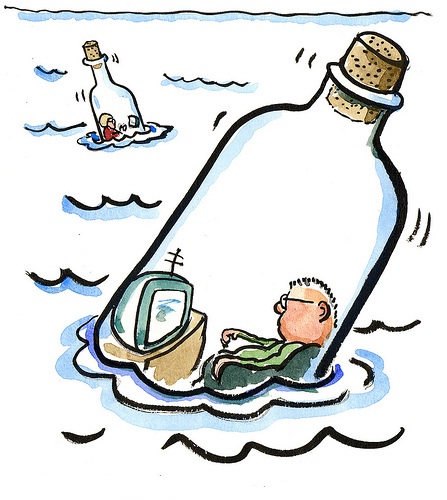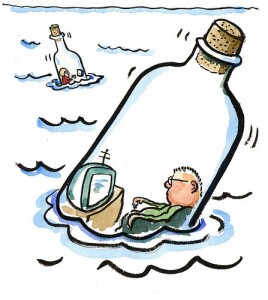
Why Are Publishers Less Optimistic About eBooks’ Future Now Than Last Year?
 Why Are Publishers Less Optimistic About eBooks’ Future Now Than Last Year?
Why Are Publishers Less Optimistic About eBooks’ Future Now Than Last Year?
By Patricia de Hemricourt
It seems to all come down to the growing number of functions provided by ereaders and tablets. But first, let’s have a look at the numbers:
In late 2011, book publishers representing 74% of U.S. publishing revenues were ask the same questions as in 2010 in a survey covering a wide range of topics concerning digital books.
Last year wisdom was that the proliferation of new technology likely means more people will read more books in the immediate future. This wisdom has aged during the last 12 months as can be seen by Forrester’s survey end of 2011.
When asked whether more people will read books than did before, thanks to digital, 47% said yes, down from 66% a year ago. When asked if people will read more books than before, thanks to digital, 60% said yes, down from 66% last year. (Full results from the survey will be presented by Forrester analyst James McQuivey at the upcoming Digital Book World Conference and Expo in New York City.)
This seems counterintuitive in view of the continued growth of sales of e-readers and tablet computer sales. So what hides behind the dwindling optimism, or growing pessimism of publishers?
The initial optimism stemmed from the logic according to which people able to carry a library in their pockets would be more likely to read more books as they would always have a book at hand. When David Weinberger, a senior researcher at Harvard’s Berkman Center for Internet & Society, an Internet research lab, confirms that people have become accustomed to filling in smaller and smaller breaks in their day with reading on portable devices, optimism should shoot up.
However, reading has always been an occupation best suited to a quiet environment with few distractions. Or, in the modern world, to a quiet screen with few distractions…This quiet screen that characterized ereaders until a few months ago, is now vanishing. The colors, ability to download movies, clips, the interruptions through various social networks or email services, connection to a phone and the possible invasion of ebooks by advertisements in the future are creating a lot of competition to plain old books and generating an increasing amount of background “noise” audio or visual, that might imperil the future of reading ebooks in peace.
Adding to this technological noise is the shortening attention span of the younger generations raised to switch from one “page” to another on the net, hopping from Facebook to YouTube, and creating endless social connection with people they will never meet but are comfortable exchanging opinions with or playing arcane games with.
With the rise to prominence of the Internet, long-form non-fiction has been deposed as the dominant form of spreading ideas, argues Weinberger, which is a long-term trend that could mean people will need to read fewer books in the future to engage with important ideas.
“Reading the Web does not lead you along a logical path, it leads you along a path of interest,” said Weinberger, who is also the author of a new book about the new nature of knowledge, Too Big to Know. “I’m not saying that the Web chases long-form out, but if you write long-form now and it goes unnoticed on the Web, then, very likely, it has failed. The Web is where knowledge is developed and where it lives.”
Furthermore, book publishing companies have long banked on the adage “The older people get, the more books they read.” Some associate the truth behind this adage to the increased solitude of older people as they retire, see fewer people at work and get less mobile and social. The ever renewing connection on the Net, that bypass traditional geographical barrier and ignores age, might put an end to this evolution of social life as the new generation grow more used to lead a large portion of their social interactions online.
So, this might spell a gloomy long time future for books the way we know them, but people always appreciated getting carried away by a story that takes many hours to go through, and storytelling will always find a way to seep in new technologies.
Maybe storytelling will take a new form and books the way know them will be seen in the 3rd millennium as a folkloric remnant of the past, such as storytellers or troubadours are today, but story telling will survive.